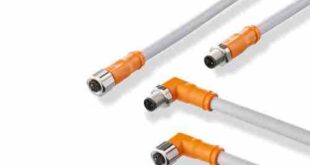The HSM14F Hall-effect single-turn encoder from MEGATRON has an extremely compact design, with a housing depth of just 6.2mm. Other features are its high resolution and long bearing life. With the optional redundant electronics, the encoder is also suitable for use in applications with increased requirements for operational reliability.
The HSM14F has a very small housing depth and diameter of just 14mm. Its compact dimensions make it the ideal angle sensor for all applications with limited installation space. The HSM14F offers a resolution of 12 bits (4096 steps) and an electrically effective angle of rotation of 360°. Angles of 90°, 180° and 270° as well as customized values are also possible.
The HSM14F Hall-effect encoder is flange-mounted. With a wide operating temperature range of -40–+105 °C and IP65 protection, the encoder is suitable for applications with increased environmental requirements. The integral sleeve bearing has a life of 100 million revolutions and the maximum operating speed is 400 min-1.
MEGATRON also modifies the HSM14F for series production according to customer requirements. For example, PWM outputs, customised output signals, different shaft geometries, shaft flattening or cable assemblies are possible.
 Engineer News Network The ultimate online news and information resource for today’s engineer
Engineer News Network The ultimate online news and information resource for today’s engineer





